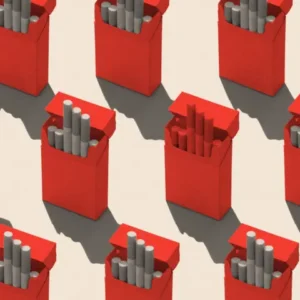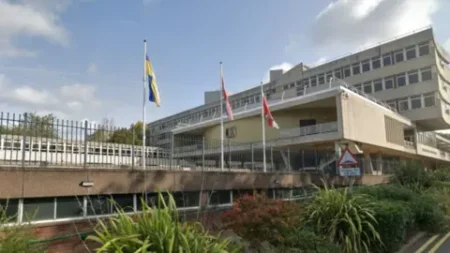The recent sale of illegal cigarettes has emerged as a significant issue on British high streets, revealing troubling undercurrents of organized crime and public disorder. The stark reality of this problem was illustrated during an investigation in Hull, where a Trading Standards officer, accompanied by BBC reporters, crawled through a shadowy underground tunnel. This tunnel, hidden beneath a high street mini-mart, held a staggering stash of counterfeit cigarettes, exemplifying the seedy underbelly of local commerce. Such clandestine practices have become alarmingly common in cities across the UK, sparking concern over the integrity of local businesses and community well-being.
Over the past few months, law enforcement agencies, including the National Crime Agency (NCA), have ramped up their efforts against illicit tobacco sales by conducting raids on high street establishments suspected of dealing with organized crime syndicates. Recent findings have pointed to a surge in these operations, particularly in areas with high immigrant populations, where sources suggest that foreign criminal gangs are exploiting the situation for profit. Investigators have reported that thousands of pounds in tax revenue are lost annually to this thriving and illicit trade, with authorities estimating losses from illegal tobacco sales to be around £2.2 billion.
In the heart of Hull, undercover reporters bought numerous packets of illegal cigarettes from various shops, highlighting the extent of the issue. Within just a few visits to a handful of shops, they were openly offered products at prices significantly lower than those found through legal channels. While legitimate cigarettes can cost £16 or more per pack, illicit options were available for as little as £3. This stark price differential is particularly enticing for customers facing rising living costs, fueling a vicious circle of demand and supply.
Key players in the trade include not just the retailers but also the networks that supply them. A criminology expert emphasized the links between tobacco smuggling and other serious criminal activities, such as human trafficking and drug-related offenses. High street shops engaged in these illicit practices are interconnected with larger systemic issues facing Britain, contributing to a broader sense of mistrust in local governance and law enforcement. Many community members expressed feeling powerless as they watched local establishments deteriorate into fronts for crime, rather than thriving business centers.
Significantly, distinguishable criminal organizations behind this trade, including Chinese triads, have laid claim to substantial operations within the UK. Reports indicate that in addition to sales profits, the illegal tobacco market is increasingly linked to forced labor, particularly within the immigrant community. Investigative efforts have been hampered by the complexity of the supply chains and funding deficits limiting the authorities’ enforcement capabilities.
Compounding the issues raised by illegal cigarette sales are the relatively lenient penalties associated with these crimes. The financial repercussions imposed on offenders often remain minimal compared to the profits derived from illegal operations. Previous fines issued to owners caught selling counterfeit cigarettes have amounted to paltry sums, with the highest recent penalties still failing to reflect the true scale of the trade. New regulations attempt to address this situation but may yet fall short of curbing the rampant illicit tobacco market observable in cities like Hull, Bradford, and Coventry.
While some politicians advocate for tougher measures against established criminal enterprises, community voices often reflect growing frustrations with the status quo. The perception that government efforts to tackle high street crimes yield little result can lead to disillusionment and erosion of public faith in institutions. Scholars have noted that the failure to manage these illicit activities contributes to broader societal anxieties, reflecting a diminishing sense of fairness and increasing mistrust in local authorities.
Ultimately, the battle against illegal tobacco is about more than just regulating products; it encapsulates a complex interplay of crime, economy, and community integrity. The impact of these illegal sales is reverberating throughout British society, threatening to undermine not only public health and safety but also the trust that binds communities together. The future of high streets, therefore, rests on the capacity of law enforcement and local governments to address this multifaceted crisis, ensuring safe and reliable environments for residents and businesses alike.











